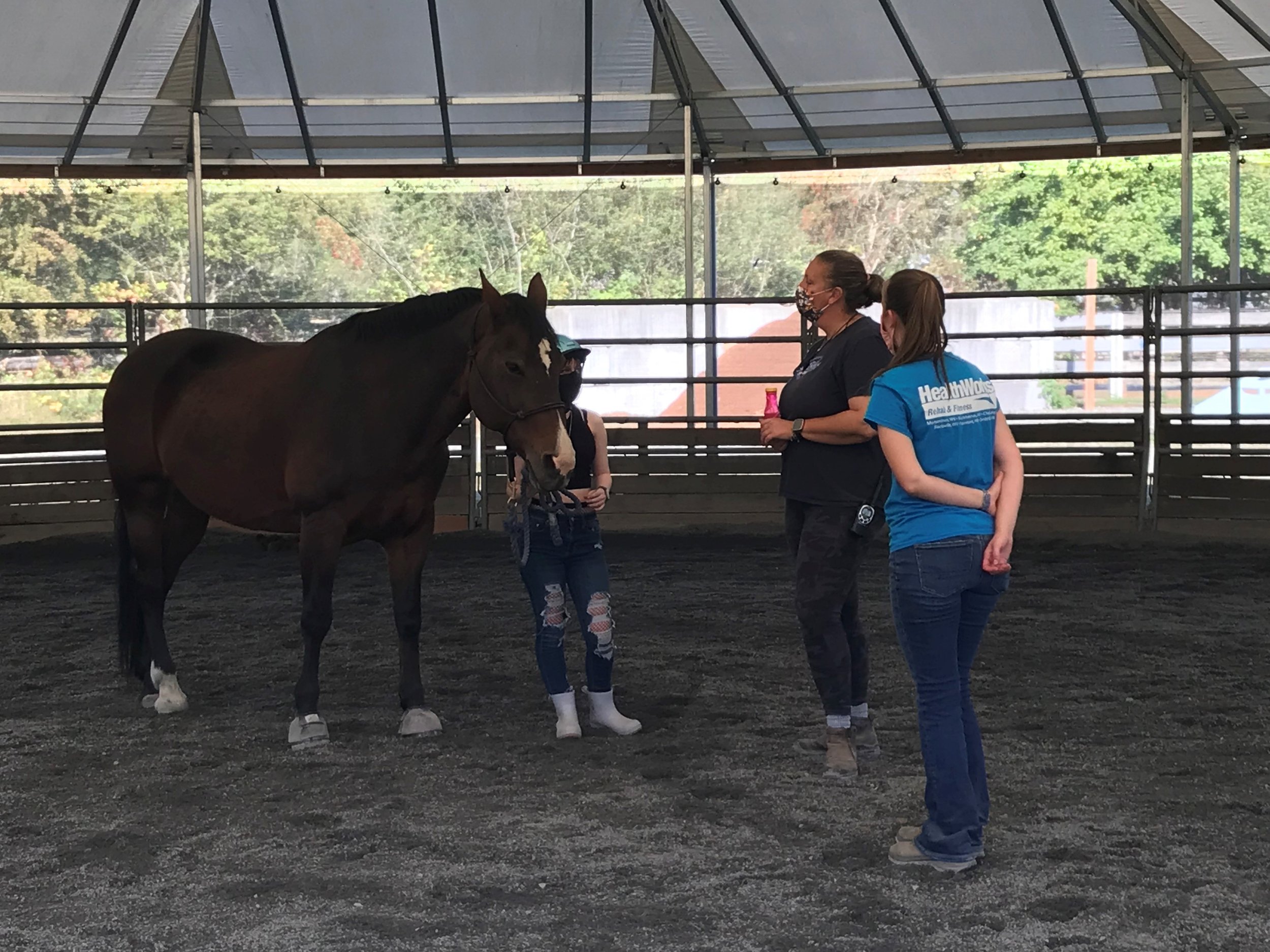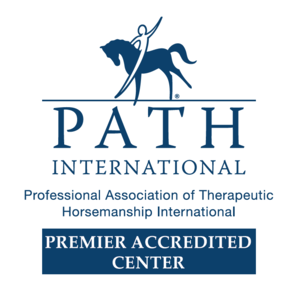As Caitlin approaches, Molly quickly moves to the front of her paddock—it’s clear she’s happy to see her. Caitlin enters the paddock and gently puts the halter on Molly before they walk together to the round pen. Despite multiple spirited horses being nearby, Caitlin leads Molly with apparent confidence, signaling to Molly there is nothing to be concerned about.
Caitlin started Equine-Facilitated Psychotherapy (EFP) at Little Bit Therapeutic Riding Center in January 2020, self-describing that she was hoping for help with navigating the challenges of her teen years and dealing with childhood events. Traditional mental health therapy works for many people, but for some, like Caitlin, it doesn’t, and they are left wondering where to turn for help. Her therapist, Melissa Cope, MSW, LICSW, meets her at Little Bit for every session, along with Kelly, a Little Bit Equine Specialist in Mental Health and Learning. Together, they customize each session to Caitlin’s individual needs. Horses are uniquely suited to EFP, because they are intuitive and will react to behavior patterns and cues that people might miss.
Melissa, who provides both EFP at Little Bit and traditional psychotherapy services elsewhere, shares, “EFP works best for individuals who have tried traditional therapy and have not had success, those who are not yet appropriate for traditional therapy, or those who have difficulty speaking directly about that which they need to address. The horse adds motivation for many individuals since they want to do what’s necessary to be understood by the horse. Patients are then able to see their own behavior from a different perspective and how it may be getting in their way.”
During their session in the round pen, at times Molly is “at liberty,” in other words, not tied to anything, while at other times she wears her halter attached to a lead rope. Caitlin practices keeping personal space when leading Molly with her halter and rope. As soon as Caitlin removes the halter, Molly wants to follow her. Caitlin and Molly are guided through desensitization exercises. Today, that exercise is blowing bubbles, and in a previous session it was moving a plastic bag. The bag used to cause a large anxious response from Molly, but through their desensitization work, it no longer feels threatening to her, so the group has moved on to a new stressor. Today, the bubbles create a small response.
One of today’s session goals is for Caitlin to help Molly work through any anxiety she feels. First, Kelly blows the bubbles while Caitlin holds Molly’s lead rope. Then they switch, eventually removing the lead rope. As the session progresses, each person in the round pen shares their observations with the group. As Caitlin changes her location in the round pen while blowing bubbles, Melissa asks, “Would Molly respond as calmly if someone she didn’t know was blowing the bubbles?” Caitlin has worked very hard to gain Molly’s trust, which likely helps Molly to experience less anxiety because of their strong bond. The team makes sure each session ends on a positive note. Today, it’s a hay treat for Molly.
When asked to describe Caitlin’s progress from her first EFP session to today, Melissa shares, “Caitlin has grown substantially in her ability to stand up for her needs and read non-verbal communication, a key to building and maintaining relationships. She is able to see the difference between healthy and unhealthy relationships and has been able to see how her behavior impacts the behavior of others through being very intentional with her horse. She is also able to anticipate problems and works to prevent them, which reduces overall stress levels. Through her work with desensitization, she has learned the importance of breaking down difficult tasks into smaller, more manageable steps.”
Thank you, Caitlin, for courageously sharing your experience with others! View the full story at www.littlebit.org/blog
Based on the number of requests for EFP services Little Bit continually receives, clearly there is a growing need in our community. In 2021, Little Bit served 15 EFP patients through 216 therapy sessions, just three percent of the participants Little Bit served that year. Little Bit also offers Equine-Assisted Learning (EAL), a program utilizing an education model rather than a therapy model.
TO SUPPORT THE EFP OR EAL PROGRAMS, PLEASE CONSIDER SPONSORING ONE OF THE HORSES THAT ARE VITAL TO THE EFP PROGRAM: PETE, PRINCESS, LOKI, LIBERTY, PUMPKIN, GIGI, AND MOLLY. TO LEARN MORE, VISIT WWW.LITTLEBIT.ORG/HORSES.
Written by Sharon Soldenwagner








